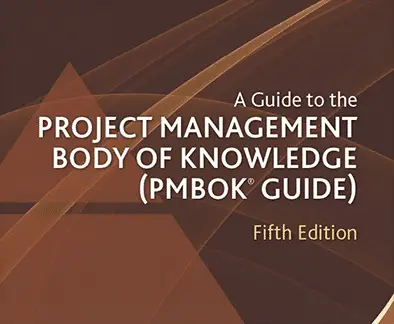The Project Management Institute recently announced the fifth edition of the Project Management Body of Knowledge (PMBOK) Guide, available in hardcover and Kindle format as well as PDF online. PMBOK 5th Edition is eagerly awaited by project management professionals in light of the addition of one more knowledge area – Project Stakeholders Management – to the previous nine.
The Fifth Edition is a milestone in the three-decade history of the PMBOK Guide since PMI published the first guide as a white paper to document the necessary framework and standards for project management.
This latest incarnation of the PMBOK Guide definitely qualifies as a collector’s item for project management experts, managers, students, and those aspiring to hurdle the certification examination for Project Management Professional (PMP).
Contents
What’s New in the PMBOK 5th Edition?
The PMBOK Guide offers a quick reference on established standards and a rich source of information to assist companies and project managers in handling projects irrespective of the project characteristics. The guide is also a valuable resource for creating project management methodologies. Aside from a tenth knowledge area, the just-released edition incorporated significant changes from the previous edition, such as:
- Introduction of two new controlling processes, namely Control Communications and Control Stakeholder Management;
- Merging of the two processes under Project Communication Management – Control Communications and Report Performance into a repositioned new process named Manage Communications;
- Addition of four processes in the planning of the newly introduced Project Stakeholders Management;
- Details 47 processes compared to 42 processes in the 4th Edition.
The PMBOK Guide is shared knowledge from the experiences of many project management experts across a broad spectrum of projects and industries. Thus, this Guide comprises both shared knowledge and best practices organized in ten knowledge areas and five processes. The knowledge areas in PMBOK 5th Edition were updated to 10 with the addition of Stakeholders Management:
- Integration management
- Scope management
- Time management
- Cost management
- Quality management
- Human resource management
- Communications management
- Risk management
- Procurement management
- Stakeholder management
Meanwhile, the five processes in 4th and 5th editions of PMBOK were retained:
- Initiating
- Planning
- Executing
- Monitoring and Controlling
- Closing
Hot Topics in the 5th Edition
Beginners, mid-level project managers and those preparing for the PMP Examination can only find the following process framework items in the PMBOK 5th Edition:
- Aside from expert judgment, the 5th edition supports the use of facilitation techniques in creating the project charter. These techniques are discussed in the newly-released Guide, and include brainstorming, Delphi technique, problem solving, etc.
- Under the Project Execution stage, meetings instead of facilitation are recommended in the management of project execution. Based on the proceedings of the meeting in this stage, change requests are used in dealing with proposals for change of scope and process adaptations.
- To control project work, forecast and work performance, data analysis is performed to generate performance reports. This development in the PMBOK Guide shows congruence with the American National Standards Institute (ANSI).
- Under the Project Integration and Control stage, tools for change control were initiated to facilitate configuration and management of change. The 5th edition also turned the change register more formal with the terminology “change log”.
Of course, the PMBOK 5th Edition has more new information in store for all project management enthusiasts. However, it is not the object of this article to spoil your zeal when you finally get your hands on this new release. The rest of the nuggets of new wisdom from the guide are all yours to discover and use in your endeavors.
Why the PMBOK 5th Edition Is a “Must” for Project Management People
The PMBOK Guide 5th Edition is designed to be of utmost interest not only for newly appointed project managers or project team leaders, but also for seasoned professionals and experienced project managers. Everyone involved and/or interested in project management will benefit from the new information offered in the new edition to keep abreast of the latest in project management practices.
This edition and the new material that comes with it will most certainly be useful in developing well-defined practices. It is also not a remote possibility that the enhancements introduced in the 5th Edition will ignite brilliant flashes of creativity and innovation that will elevate the art and science of project management to new heights.
Both project managers and students of project management will also consistently benefit from the 5th Edition as they gain insight and develop their skills in distinguishing between generally practiced processes and those which are endemic to a particular organization. Students and employees who are gearing up to obtain a certification as a Project Management Professional will find the PMBOK 5th Edition invaluable review material from foundational concepts, to process framework, to professional responsibility. Prospective examinees cannot afford to miss this PMBOK Guide because this is the first officially-released PMI resource on the tenth knowledge area on Project Stakeholders Management.
A cursory look at job adverts for project manager positions in any online job listing or classified ads in broadsheets consistently mention the need for project management certification. Whether the requirement specifies that having the certification is an advantage, highly preferred or is a “plus”, it all boils down to one thing – success in the field of project management is closer to practitioners who have passed the PMP Exam. This is one of the best reasons for every aspiring project leader to get promoted and scale the ladder of success. Get serious about reading the PMBOK 5th Edition.
While engaging in PMP Exam Simulation as a form of practice or review is a good move, one can only be as confident in the real thing when the result of the simulation is encouraging. But just like immersing oneself in a video game, satisfaction in playing the game and manipulating the console can only be achieved by reading the manual, or at least knowing what the controls are.
The manual of success for the PMP Certification and the field of project management is the PMBOK 5th Edition. A PDF eBook of the PMBOK 5th Edition is available for free download from the Project Management Institute provided you are already a member, although you may also want to purchase the hardcover book to keep on your shelf.

Tom Davis is a technical contributor at TechWombat. He enjoys writing on IT, open source, electronics, and other geeky arcana. Tom’s always happy to reply to comments and corrections, so be nice and send him your thoughts at tomdavis@techwombat.com or in the comment section below.

